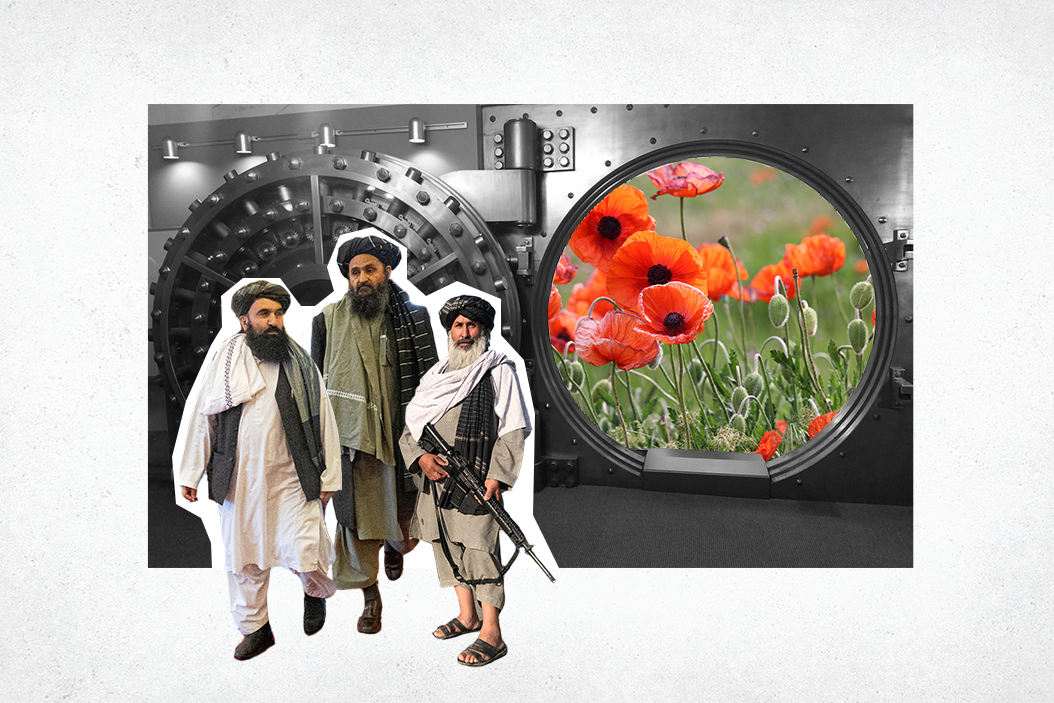The Taliban are in control of Afghanistan again. But winning militarily is one thing, governing a country of 40 million people is an entirely different story.
Running a government — even a fundamentalist, tyrannical regime — relies on access to cash and financial assets. That presents a massive problem for the currently-emboldened Taliban, who have been shunned by most global economic heavyweights, and now face potential financial upheaval.
How much money do the Taliban actually have? The US government flushed billions of dollars into the Afghan military, and still, the Taliban managed to swiftly install itself in the presidential palace in Kabul. That's in part because over the past two decades, the Islamic militia has been raking in a lot of dough, allowing the group to streamline its operations and self-fund its insurgency without being beholden to outside players.
Much of this cash comes from illicit activities, like the bountiful opium trade, extortion, and illegal mining. By some estimates, the Taliban made in 2020 alone $464 million from illegally mining iron ore, marble, copper and rare earths from the country's mineral-rich mountains, often strong-arming Afghan mining companies into giving Taliban fighters access and hitting them with hefty levies.
Drug trafficking, however, remains the most lucrative funding source for the Taliban: according to the UN, Afghanistan is responsible for 85 percent of the global opium supply, and the lion's share of the profits flows directly into coffers of the Taliban, whose kingpins control most of the country's poppy fields.
Moreover, in addition to some foreign funding from countries including Pakistan, as well as the UAE, Qatar and Saudi Arabia that have their own strategic interests in Afghanistan, the Taliban reaped around $1.6 billion during the financial year ending March 2020. That's a massive sum for a group whose biggest expenses have been buying weapons, paying fighters' salaries, and training Taliban wannabes.
But the Taliban will soon find out that illegal cash flows, however hefty, can only take you so far. In the immediate term, the Taliban have to find the funds to pay civil servants, as well as to maintain security, and provide basic public services, like keeping hospitals functioning amid the ongoing pandemic.
While this might be manageable in the near term, things could go south soon considering drastic steps taken by the US in recent days to block the Taliban from accessing foreign reserves and the broader international financial system.
Why is the US government squeezing the Taliban, and why does it matter? As recently as last week, the Afghan government held more than $9 billion in foreign reserves, most of which are held in US banks. But as the Taliban descended on Kabul, President Joe Biden froze US-held Afghan assets. The Taliban now only have access to a meager 0.1-0.2 percent of this entire foreign stash. (To date, 80 percent of Afghanistan's budget has come from the US and other donors.)
What's more, under intense pressure from the Biden administration, the International Monetary Fund said Wednesday that it will no longer deliver around $463 million that was set to be doled out to Kabul as part of a pandemic-relief program for poor countries. Indeed, Washington hopes that this hardline approach will bring the Taliban to its knees.
Still, the corrupt US-backed Afghan government — formerly led by President Ashraf Ghani, who this week reportedly fled Afghanistan with cash-filled duffle bags in tow — had stashed away $362 million on Afghan soil, as well as some gold and other keepsakes that are now in the hands of the Taliban.
Can anyone make up the difference? China has already been making overtures to the Taliban, using economic incentives as its key diplomatic tool. Beijing has linked cash and reconstruction efforts to certain conditions, namely ensuring that Afghanistan does not become a breeding ground for terrorism, threatening Beijing's interests.
Having China on their side would be a significant boon for the internationally-isolated Taliban, which likely hope that Beijing might use its clout at the China-led Asian Infrastructure Investment Bank to help secure loans.
Russia, which stands accused of propping up the Taliban for years (including offering bounties for the Taliban to kill US soldiers), has also made it clear that it might be willing to deepen relations with the group in exchange for stability in Central Asia.
Unequal pain. It may be a while before the Taliban really feel the economic pinch. As cash runs dry, however, regular Afghans, who benefited from US programs and foreign aid, are likely to suffer much sooner. Indeed, twin financial and economic crises will make it harder for the Taliban to consolidate power, and could cause the group to engage in even more brutal, thug-like governance.
- Afghan reality check - GZERO Media ›
- No exit from Afghanistan - GZERO Media ›
- No exit from Afghanistan - GZERO Media ›
- Taliban 2.0: Afghanistan on the Brink (US AWOL) - GZERO Media ›
- The Taliban has only made “cosmetic changes” since the 1990s, says author Ahmed Rashid - GZERO Media ›
- Has the Taliban changed since the 1990’s? - GZERO Media ›
